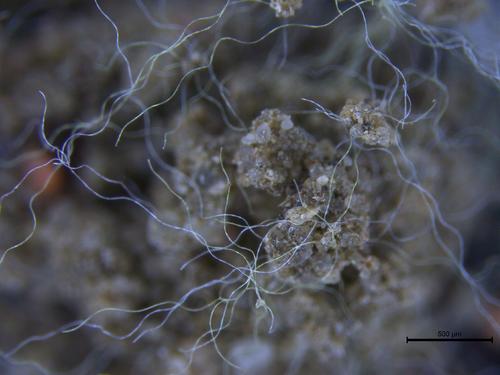Microplastics: Dangerous for the Soil?
First Experimental Study on the Influence of Microplastics on Soil and Its Microorganisms
№ 210/2018 from Aug 09, 2018
A team of scientists at Freie Universität investigated the physical and biological effects of microplastic particles on the soil and its microbes. Soil microorganisms play a central role in many biogeochemical cycles, such as the decomposition of organic matter and the binding of carbon in soil. The research project provided the first experimental evidence that microplastics can change the biophysical conditions of soil as well as the functional activity of microbes. More studies are needed to show whether, and if so, how plastics – as anthropogenic, or human-induced – stressors have a long-term effect on the ecosystem of the Earth. The findings of this pioneering study were published in the latest issue of the prestigious journal Environmental Science & Technology.
Led by environmental scientist Dr. Anderson Abel de Souza Machado and biologist Prof. Dr. Matthias C. Rillig, the team had already pointed out the danger of pollution from microplastics in a previous study The new research provides experimental evidence for the first time that plastic particles have biophysical effects on soil. In the experiments soil was contaminated with four different types of microplastics in increasing concentrations. The scientists incubated these soil samples under natural conditions for five weeks in an experimental garden at Freie Universität. They then studied the soil and the activity of its microbes. The experiment showed that plastic particles, especially polyester fibers, exerted an influence on fundamental structural properties of the soil and its interaction with water. The soil bulk density (how tightly the soil particles were packed) and the interaction of those particles in forming aggregates were different when microplastics were present in the soil. Plastic particles increased or decreased the size of pore space in the soil and influenced how much water the soil could absorb. The microorganisms in the soil samples were thus forced to change in response to the new environmental conditions. Their activity showed signs of functional change.
The authors point out that this is the first study of its kind. Therefore, it is not yet clear whether these changes will have a long-term negative impact on the soil and its ecosystems. “It might be too early to fully elaborate on the mechanism driving the microbial responses and to predict its consequences, but the fact is that microbes are perceiving the environmental change initiated by microplastics pollution and responded to it,” explains Matthias Rillig.
Press Images
Polyester fibers in soil. © Machado AAS
The photo is available to media representatives for download. It is free of charge if used in the context of the press release and due credit is given.Overview of the findings. © Machado AAS
The image is available to media representatives for download. It is free of charge if used in the context of the press release and due credit is given.Polyester fibers in soil
Polyester fibers alter the structure of soil and influence clumping. (Image credit: Machado AAS)
The photo is available to media representatives for download. It is free of charge if used in the context of the press release and due credit is given.Overview of study findings
Figure: Graphical summary of the study results. Each contamination with different types of plastic fundamentally influences the soil and its functions - also as a habitat for microorganisms. (Image credit: Machado AAS, Journal “Environmental Science & Technology”)
The figure is available to media representatives for download. It is free of charge if used in the context of the press release and due credit is given.Further Information
Link to the Publication
De Souza Machado, Anderson Abel; Lau, Chung Wai; Till, Jennifer; Kloas, Werner; Lehmann, Anika; Becker, Roland & Rillig, Matthias C. (2018). Impacts of microplastics on the soil biophysical environment. Environmental Science & Technology. DOI: 10.1021/acs.est.8b02212
www.pubs.acs.org/doi/10.1021/acs.est.8b02212
Contact
Dr. Anderson Abel de Souza Machado, Researcher, Institute of Biology, Freie Universität Berlin, Tel.: +49 30 838 53143, Email: abel.machado@fu-berlin.de
Dr. Matthias C. Rillig, Professor, Institute of Biology, Freie Universität Berlin, Tel.: +49 30 838 53165, Email: rillig@zedat.fu-berlin.de, Homepage: www.bcp.fu-berlin.de/en/biologie/arbeitsgruppen/botanik/ag_rillig/index.html


